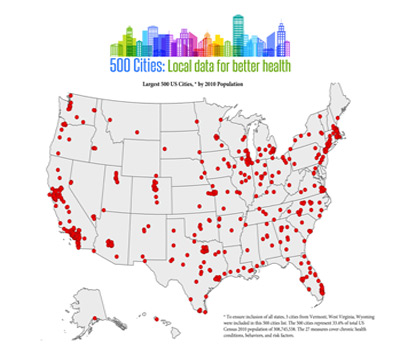‘500 Cities’ website: Users can explore neighborhood health data
Potential to improve the health of millions of Americans
Press Release
For Immediate Release: Thursday, March 2, 2017
Contact:
CDC Media Relations
(404) 639-3286
CDC Foundation Media Relations
cgreenwell@cdcfoundation.org
404-443-1126
Robert Wood Johnson Foundation Media Relations
media@rwjf.org
609-627-5937
Users of a new, interactive web application can view and explore city-and neighborhood-level health data for America’s 500 largest cities. The application is part of the 500 Cities Project, a partnership with the Centers for Disease Control and Prevention (CDC), the CDC Foundation, and the Robert Wood Johnson Foundation. The project is made possible through a grant to the CDC Foundation from the Robert Wood Johnson Foundation.
The project identifies, analyzes, and reports on 27 chronic disease measures focusing on conditions, behaviors, and risk factors that have a substantial effect on people’s health. It represents a first-of-its-kind effort to provide city- and neighborhood-level health estimates for a large proportion of the nation’s population.
Americans face many health-related challenges, including chronic conditions such as heart disease, arthritis, and diabetes and negative health behaviors, such as insufficient physical activity. Until now, data to effectively address these and other health challenges facing cities and neighborhoods have been limited.
“Having the ability to report and map health data at city and neighborhood levels is a game changer for public health,” said Wayne H. Giles, M.D., director of CDC’s Division for Heart Disease and Stroke Prevention. “Local level data available through the 500 Cities website provide health information to better inform and target strategies that are proven to work in improving health.”
Statistical small area estimation techniques are used to model the prevalence estimates for the cities and neighborhoods from the CDC Behavioral Risk Factor Surveillance System. The new web application enables public health professionals, policymakers, and researchers to see and use the data to effectively address and target interventions to specific areas where they are most needed. The interactive mapping application enables users to zoom in to their neighborhood and look at local data compared with data for the entire city.
“The 500 Cities Project reflects an innovation in health data for more than 100 million people – a third of the U.S. population,” said Donald F. Schwarz, vice president for program at the Robert Wood Johnson Foundation. “For the first time, anyone who cares about the health of those living in our cities can access data down to the city and neighborhood levels for both the conditions and behaviors that have a substantial impact on population health. This is also the first time that cities can access data on how neighborhoods compare across cities.”
The 500 Cities data can be used to:
- Identify the chronic health issues facing a city or neighborhood
- Identify emerging chronic health problems
- Establish key health goals
- Develop and implement effective and targeted prevention activities
“To ensure the health of America’s neighborhoods and communities, it is vital to understand the scope of the nation’s most pressing health challenges,” said Judith A. Monroe, M.D., president and CEO of the CDC Foundation. “We are grateful to the Robert Wood Johnson Foundation for this important grant, and are excited to see the potential for this data.”
To learn more about the 500 Cities Project data visit CDC’s website.
About the Centers for Disease Control and Prevention
The Centers for Disease Control and Prevention (CDC) works 24/7 to protect America from health and safety threats. Whether these threats are global or domestic, chronic or acute, curable or preventable, natural disaster or deliberate attack, CDC is the nation’s health protection agency.
About the CDC Foundation
The CDC Foundation advances the mission of the Centers for Disease Control and Prevention through effective philanthropy and public-private partnerships that protect the health, safety and security of America and the world. Established by Congress more than two decades ago, the CDC Foundation is an independent, nonprofit organization that has launched nearly 900 programs and raised more than $662 million through partnerships with philanthropies, corporations, organizations and individuals. The CDC Foundation currently manages more than 300 CDC-led programs in the United States and in 85 countries. For more information, please visit www.cdcfoundation.org.
About the Robert Wood Johnson Foundation
For more than 40 years the Robert Wood Johnson Foundation has worked to improve health and health care. We are working with others to build a national Culture of Health enabling everyone in America to live longer, healthier lives. For more information, visit www.rwjf.org. Follow the Foundation on Twitter at www.rwjf.org/twitter or on Facebook at www.rwjf.org/facebook.

